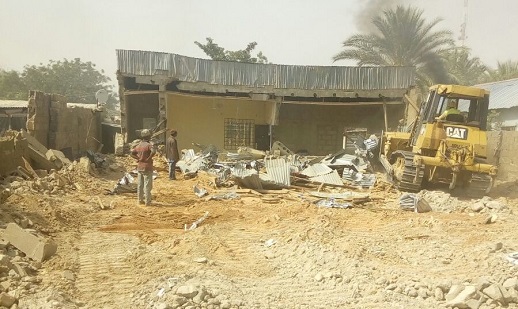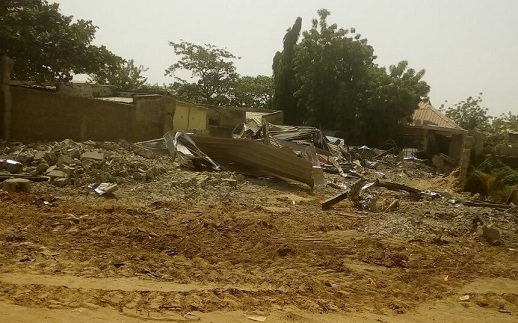
Anxiety is high among Christian communities in Nigeria’s northern state of Jigawa after authorities began demolishing church buildings in Dutse, the state capital.
On 11 January, bulldozers, escorted by security forces, reduced to rubble the Redeem Christian Church of God and the Lord Chosen Church.
They arrived at the Redeem Church at about 10am, according to Rev. Yakubu Musa, chairman of the Christian Association of Nigeria (CAN) for Jigawa.
The Executive Secretary of Urban Development and some key police officers were at the scene. The police blocked all the entrances to prevent church members from entering the premises. Those who tried to take pictures were chased away by police officers.
The bulldozers first removed the fence. They then demolished a small building inside the premises, before destroying the main church building.
At around 12 noon, they went to the second church, which was also completely demolished.
“It was a terrible experience, with so many Christians who witnessed the demolition crying,” said Rev. Musa. “I felt so bitter because we were in a situation where you have been cheated and you cannot talk.”
The authorities said they carried out the demolition because the church buildings had been built illegally. According to the Executive Secretary of Urban Development Board, Alhaji Garba Isa, the churches were built without obtaining permission as required by law. He also said notices were sent to them three times to discontinue the development of their buildings.
But Rev. Musa rejected the claims. He said there was no notice of demolition issued to the pastors of the two churches, or the leadership of CAN.
“They just came in unexpectedly and they demolished everything. Nobody was allowed to remove any valuables in the church buildings and other nearby properties,” he said.
Both churches had applied for official registration documents, he said, but the government had refused to grant them.
The Lord Chosen Church had been standing for 17 years and the Redeem Christian Church of God eight years. Moreover, all the churches in Dutse have papers proving ownership, which directly emanate from the original indigenous owners, who were given customary rights to use their land freely.
“I was very angry because there were two mosques in that same place, but none of these mosques were demolished,” said Rev. Musa. “There is also another building belonging to a Muslim person, which was marked for demolition, but they only concentrated on the church buildings because we are not many and we don’t have anyone in the government to speak for us.”

Widespread discrimination
Situated in northern Nigeria, Jigawa is among the 12 states which adopted Sharia in the 2000s. This has prompted growing intolerance, which has resulted in widespread discrimination against Christians in the majority-Muslim states.
Christians living in Sharia states say they are treated as second-class citizens and denied basic rights, such as access to education or certain jobs. Access to land and building permission are very restricted or denied. Land, school or health services belonging to churches are often confiscated by state authorities without any compensation.
“We feel we are equally citizens of this country and we have the rights to be allowed to practise our religion. But this demolition was done out of injustice and discrimination,” said Rev. Musa.
He said that for the last 10 years the governor of Jigawa had closed his door to Christians and rejected the chance to meet with the CAN leadership, despite numerous attempts.
“The authorities didn’t give us any attention. They didn’t invite us for meetings but on the other hand, the imam was always there,” he said.
“From all our 36 churches in Dutse, none of them has got building permission because they are not responding to our applications, though we have several copies of our applications seeking permission to build churches.
“They don’t permit it because they do not expect churches to be established there.”
Six more churches have been earmarked for demolition: The Deeper Life Bible Church; the Catholic Charismatic Renewal Ministry; the Methodist Church; the Presbyterian Church; the Redeem Church II and the Baptist Church.
Churches in Jigawa have witnessed significant growth and most have reached their capacities, while some are overcrowded.
For now the authorities have not set any plan for compensation or any other alternative. The two (demolished) churches will now hold their Sunday services and other weekly programmes in the open air.
In January 2015, a plan to demolish a church in neighbouring Katsina State sparked tensions in the town of Matazu.
The authorities issued a three-day notice of demolition to the church, which was over 99 years old and situated in the ECWA Church Headquarters Mission Compound, which also has a school and staff quarters.
The authorities said they were preparing to construct a road that would pass through the church compound. They also said the development of the site was carried out illegally.
But ECWA argued that the proposed road would only succeed in dividing the compound into two and that the compound leads to nowhere.
The President of Tarayyar Masihiyawan Nijeria, an advocacy group for Christians of Hausa and Kanuri origins, vowed to resist the action.
“It is pure religious persecution; the compound is owned by us and has been there for over 99 years,” said Gen. Ishaku Ahmed Dikko (Rtd). “The decision is a continuation of the marginalisation and persecution of Christians in the north.”
In the end, the government abandoned the plan to build the road and allowed the church to remain, following media coverage of the controversy.